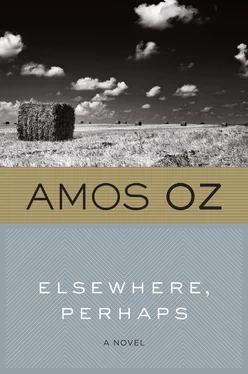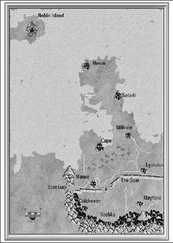Sometimes in the evening thick clouds of dust billow among the houses and settle broodingly in the trees. But the breezes soon tire of their quarreling. A light westerly wind caresses our brows and fills us with longing.
After the game Rami picks up his shirt, wipes the sweat off his body with it, and goes to Fruma's room. At this time even Fruma is not her usual sullen self. She is sitting on her veranda, wearing a flowered apron, pressing grapes into a jug. Rami stays with her for a quarter of an hour or so. Nibbles her cookies. Quenches his thirst with grape juice. Helps his mother to hoe and weed her garden. Fruma struggles to put his impending departure out of her mind. Occasionally she sighs. Rami hears her and grimaces.
Opposite, on the other side of the lawn, the Harish family are relaxing. The father is leafing through a book. The daughter is deep in her pretty embroidery. Even Gai, the prodigal son, has returned to the bosom of his family for a few moments. If it were not for the curious tin helmet on his head, we would find no fault with him.
On the dust path Bronka Berger and her daughter-in-law, Einav Geva, are taking a stroll together. They are deep in women's talk, about things a pregnant woman mustn't do, how to tell the sex of the child, good and bad things to eat. Bronka wants a granddaughter, Einav wants a son. So they disagree about the signs. Mutual affection shows on their faces. Their stroll, like everything around us at the moment, is calm and peaceful. Oh, how good it would be if we could make time stand still, if we could finish our story at this point with a shrug of the shoulders: and they all lived happily ever after. Anyone who looks forward to complicated happenings betrays his own perverse inclinations. But time flows heedlessly on, on its unseen course. The sun is about to set. Points of light appear on the mountain heights opposite, beyond the border. The men and women of the kibbutz patiently fold up their deck chairs and get ready for the communal supper. Herzl Goldring asks Nina if it is seven o'clock yet. Nina says it is. Herzl says he has to go and turn off a sprinkler behind the armory before supper. Nina asks him not to be too long. He promises, and keeps his word.
One Friday night, after the festive meal, which had opened with the lighting of Sabbath candles and the hooting of owls, Rami Rimon slips out and makes his way alone to the water tower. Quickly he climbs it. He moves up rung by rung till he reaches the top of the tower, squeezes his body against the iron railing and over onto the observation platform. Even an unromantic youth may well feel sad and seek a moment's solitude. From his lofty lookout post a strange, hazy scene meets his eyes. The sky has turned a dark gray. Beyond the gray screen the dying sun writhes convulsively in a mist of purple, yellow, violet, and gold.
In the enemy positions there is some movement to be discerned. For three or four days now they have been massing their forces. Rami screws up his eyes, the left eye especially, to see better. Military vehicles with six double wheels crawl around, surrounded by dim human forms. Yoash used to say: "Those people understand only one language, the language of violence. They interpret restraint as cowardice. And they're right. Our old men can't understand that, because they're still Europeans even here in Asia, and because of the time-honored Jewish love of peace. But one day their pressure will make life here unbearable for us, and we'll get permission to smash the Arabs, and after that the map of Israel won't look like a bent sausage any more." I was only a small child then. I didn't understand what he meant. In those days I was impressed by external signs, by Yoash's uniform, his green battle dress with its camouflage markings, his red beret, the badges. But now I understand what it's all about. Father always used to say: "Israel must be the opposite of the ghetto. If we're going to live in a ghetto here, we might as well have stayed in Europe. At least there we didn't have the hamsin. " Father was such a little man, a little Jew, pale and sick and always humming Hasidic tunes, but deep down he wasn't a Jew, he was a man. That's why Yoash and I grew up to be men. If I'm killed. Mother will become a martyr. They'll all walk round her on tiptoe. And Noga will know. She'll curse herself for laughing at me. And for what she didn't give me before I was killed.
Rami curls his lips. There is no one here now to make fun of his horse's face. Even if there had been anyone here, he would not have dared make fun of him now that he is so upset. He thinks about the tough life in the army, which shows up the true man among the flock of spoiled chatterboxes. His chest fills. His future feats and exploits throw his mind in a whirl. You'll see. I'll show you. Yoash. Everyone. The lot of you.
He hears the sound of singing, long-drawn-out and poignant. Our kibbutz is welcoming the Sabbath with the slow, solemn melodies of the traditional table songs. The distance blurs the tunes and imbues them with a mournful, incantatory tone: Come, beloved, to greet the Sabbath. Sabbath descends on the Vale of Ginosar. Rami does not think about the words of the songs, but weaves from their threads a tissue of dreams.
He thinks about women. He has read somewhere recently that a woman's heart is a riddle that no man can solve. Women really do live in a different world. A more colorful world. Even when they are with you, they are not really with you. But the fault is yours. You let her fix the rules of the game. There is an expression "to conquer a woman." Like an enemy stronghold. Like fortifications. If you are like a woman, no woman will ever surrender to you.
Rami tosses his head. He hears a light throbbing in his temples. His sadness gives way to a firm determination. An end to all that. Once and for all.
Full of resolution he climbs down from the tower and turns his steps toward Noga's room.
No more beating about the bush. Straightforwardly. Simply and straightforwardly.
That evening Rami Rimon tried to beat a new path to his friend's heart, a simple, straightforward path. Heedless of mischievous tongues, he went into Noga's room. Dafna Isarov could not restrain a soft exclamation of surprise.
Noga is in, lying on her stomach, her tiny chin propped up between her elbows, her body smelling sweetly after her Sabbath shower, her beautiful hair still damp and heavy. She is engrossed in a volume of poetry by a young poetess.
Rami made a sign to the plump Dafna: Would she mind excusing them? Dafna blushed fiery red, as if caught in the act, and fled from the room, without a backward glance. Rami crossed the room. Sat on the edge of Noga's bed. Put his hand on her shoulder.
"Put the book away."
Noga inquired if that was an order.
"Maybe. I want to talk to you."
"I thought you were going to attack me."
"I want to talk to you."
Gently, lazily, the girl changed her position. She had been lying on her stomach. Now she turned on her side. She cast a lively green glance at Rami.
"I'm listening."
"I've been thinking, and now I've decided. That's what I wanted to say."
"Is that all?"
"I've decided I don't want to join the paratroopers. Ill go into the infantry. Not like my brother. I'll start the hard way. In an obscure fighting unit. Wherever they send me."
"Why? Don't you…"
"I don't care," Rami interrupted, his Adam's apple bobbing up and down rapidly. "I want to do it the hard way. But you'll see, both of you. First the infantry. Then IU do a course and be a section commander. Then an officer. And then IU come back here."
"To be near me?"
"To fight here."
"Child."
Rami grabbed Noga's ribs and squeezed them till she cried out in pain. Outside the door a stifled sound was heard. Evidently Dafna, listening at the door, had broken down and was struggling with her laughter. Rami swore loudly, and the eavesdropper fled. Now he pressed his broad hands against Noga's breasts until she let out a soft groan.
Читать дальше












